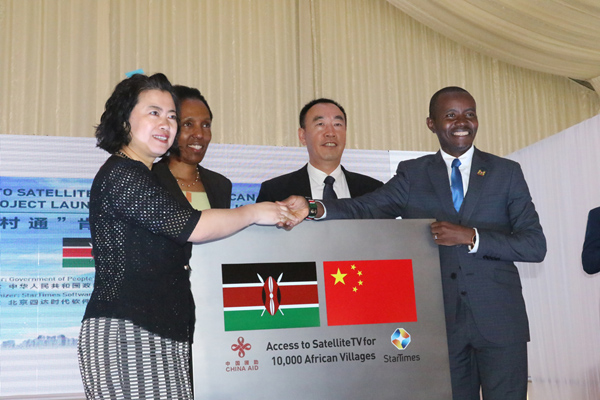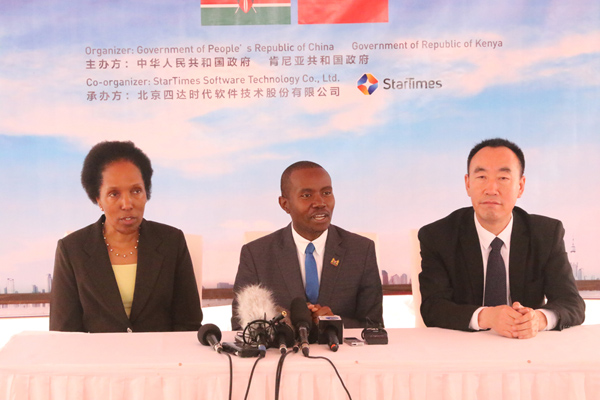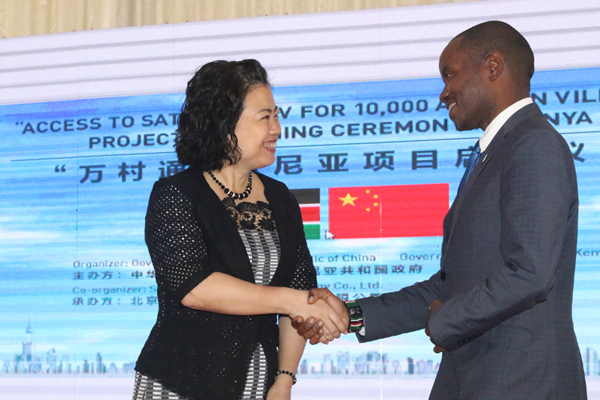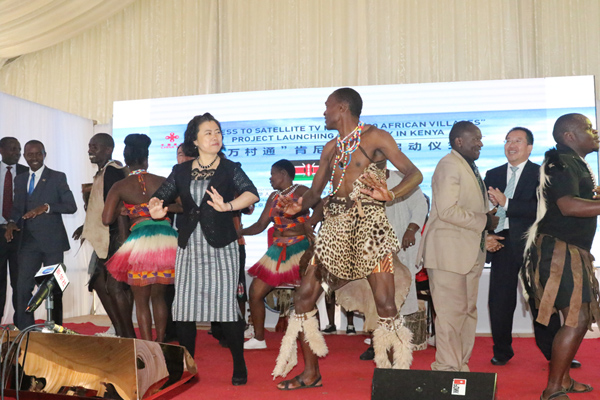China, Kenya work together to bring TV to remote areas

Sun Baohong (front left), China's ambassador to Kenya, shakes hands with Joe Mucheru (front right), Kenya's ICT cabinet secretary, during the launch of a project to bring satellite TV to 800 villages. The launch was held in Nairobi, Kenya on Thursday. Catherine Gitau, secretary of the ICT, and David Zhang, CEO of StarTimes Kenya, look on. [Liu Hongjie/China Daily]
The government of China in partnership with Kenya's Ministry of Information
Communication and Technology rolled out the 800 Villages Digital Television
Project on Thursday, which aims to bring satellite television services to 47
counties in Kenya.
Through the project, 16,000 individual households in 800 villages will be connected with satellite television services, each via a satellite dish, a high definition top box, and other accessories. In addition, 2,400 public institutions will be connected via a satellite projector TV system and 32-inch television sets.
StarTimes Kenya, a Chinese digital TV provider has been contracted to undertake the project, which is being financed by the Chinese government at a cost of $800,000. Half of the money will be used to purchase equipment and the rest will used to implement the system.
The project is one of the 10 China-Africa cooperation plans announced by President Xi Jinping during the 6th Ministerial Conference of the Forum on China-Africa Cooperation (FOCAC), which was held in Johannesburg, South Africa in 2015.

Catherine Gitau (left), secretary of the ICT, Joe Mucheru, the ICT's cabinet secretary, and David Zhang (right), CEO of StarTimes Kenya, attend a press briefing in Nairobi, Kenya on Thursday. [Liu Hongjie/China Daily]
Dubbed "Access to satellite TV for 10,000 African villages", the project aims to reduce the digital divide in rural African areas by ensuring villages have access to digital television. The "digital divide" is the concept of inequality in terms of access to technology. African countries have struggled to close the digital divide and bring information and digital technology to remote areas.
The project is aimed at helping rural African families access information about the world, improve agriculture, and knowledge about science and sanitation, which will reduce poverty.
StarTimes Group was appointed to roll out the program because it is a multinational media company and content provider working in the African television broadcasting industry.
Speaking during the 800 villages project launch ceremony in Nairobi, Kenya, Sun Baohong, China's ambassador to Kenya, noted that out of the 10,000 villages being helped across Africa, Kenya had the most, something that indicates the deep friendship between the two countries.
"As Kenya's long-standing friend and one of its most important development partners, China has continued to support the development of this East African country and the well-being of its people," she said.
Joe Mucheru, the cabinet secretary in the Ministry of Information Communication and Technology, said both the Chinese and Kenyan governments had elaborate structures in place to ensure the project works as it is meant to.
"The launch of this project, demonstrates the increased mutual cooperation between the two countries, aimed at promoting the socio-economic and political prosperity of our two economies," he said.

Sun Baohong (left), China's ambassador to Kenya, shakes hands with Joe Mucheru, cabinet secretary in Kenya's ICT ministry, at the launch of the project to bring satellite TV to 800 remote and rural villages. [Liu Hongjie/China Daily]
David Zhang, CEO of StarTimes Kenya, said the project was a strategic effort aimed at ensuring more Kenyans are not only informed, but entertained.
"Up to 20 percent of Kenyan's are yet to get access to the digital terrestrial television platform," he said. "The village satellite television project therefore will be a timely solution, as it will be accessible across the country, thus ensuring increased access to information for the beneficiaries."
Zhang noted that up to 150 engineers have been trained in the best technical practices.
"Over 1,600 job opportunities will be created," he said. "We intend to train at least two maintenance technicians in each of the 800 villages, in efforts to ensure sustainability of the project beyond the installation period."
Zhang reiterated his company's commitment toward the successful and timely completion of the project.
"It is my belief that, come October, we will converge again to celebrate the handover of the project," he said.
Catherine Gitau, secretary in the Ministry of Information Communication and Technology, said she was confident many people's lives would be transformed by the project by its implementation at the end of October.
"Article 35 of Kenya's constitution guarantees the rights to information and Vision 2030 aspires that every Kenyan has a high-quality life," she said. "I believe, for many rural Kenyans, having a digital TV is part of that high quality life."

Sun Baohong, China's ambassador to Kenya, joins dancers during the launch of the project to bring satellite TV to 800 villages in Nairobi, Kenya on June 7. [Liu Hongjie/China Daily]

Follow us on WeChat
京ICP备18041594号-1
京公网安备 11010202005508号

Follow us on WeChat


